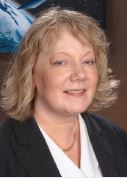Laurie Rokke - 2015 SPIE Women in Optics Planner
Chief Operational Products Branch, NOAA/NESDIS/Center for Satellite Applications and Research (STAR), USA
Country of Birth: USA
Educational Background: DPhil Physics, University of Oxford, England; MS Meteorology, University of Wisconsin-Madison; BS in Aeronautical Studies & BA Geography, University of North Dakota USA
I was always fascinated by clouds. I got my pilot's license at 19 to fly in them and now I work on satellites that view them from space to understand atmospheric chemistry and dynamics.
For me, long-term career planning was the biggest obstacle as most of the jobs and/or satellite instruments I have worked on did not exist 5 or 10 years before I undertook them. I looked for opportunities that would help me to grow as a physicist - some risky, some challenging but all prepared me for the next career step.
Make sure you have good command of the tools (mathematics, physics, etc.) that you will use to build instruments, theories and a career.
If you have both a sense of discovery and adventure, STEM is a career path that will enable you to grow and contribute knowledge in many different areas.